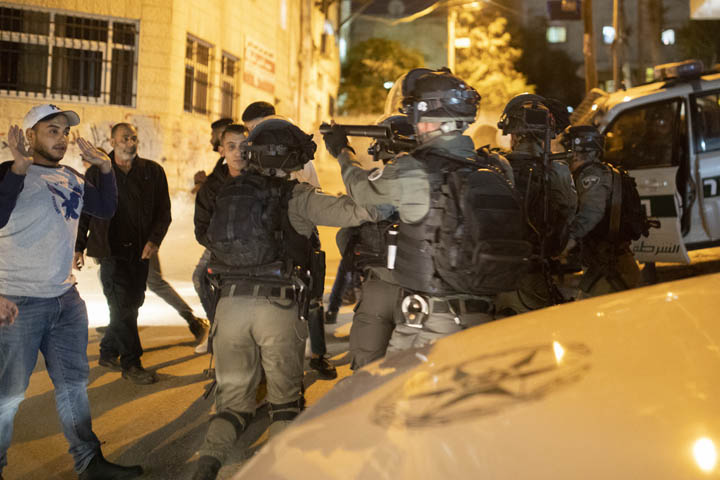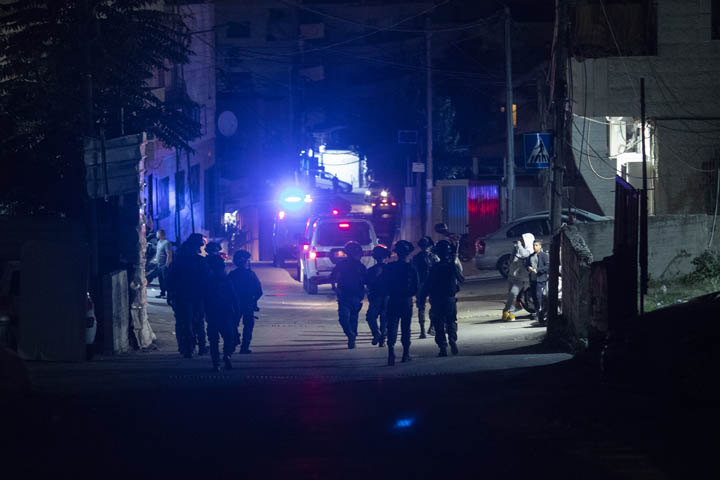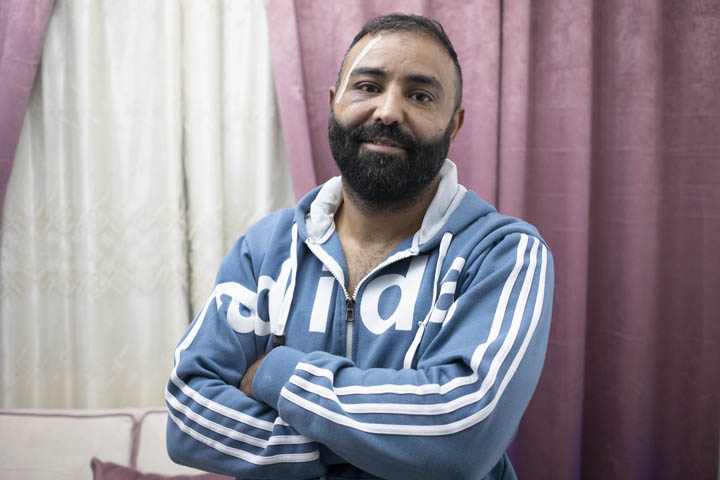
In the East Jerusalem neighborhood of Issawiya, Monday evening looked like this: Border Police and riot police jeeps roving constantly; officers arresting a young Palestinian and beating his peers who try to protest; cops pepper-spraying an elderly man; and a police drone circling over people’s homes, reminding them who is watching them from above.
It was, relatively speaking, a “calm” evening, the latest in a police operation in the neighborhood that began six months ago. Its purpose is still unclear to residents, political activists, journalists — even some police officers.
I joined a group of Israeli activists who go to Issawiya every evening to show solidarity with its residents, in the hope that their presence and documentation of cops’ behavior will somewhat reduce the level of police violence. The Israelis team up with local activists to patrol the streets, in an effort to help residents go about their lives without being arrested or wounded.
Since the start of the operation in May, Issawiya has experienced daily and nightly police raids, searches, arrests and roadblocks. It is difficult to explain why the operation began then; there were no statements from the police about violent activity in or around the neighborhood in months prior.
In late June, police shot dead 20-year-old Mohammed Obeid. In August, a report in Haaretz revealed that police had planted a weapon in the home of a local resident for the purposes of an Israeli reality television show called “Jerusalem District.”
Toward the start of the school year, the local parents’ committee threatened to suspend the start of the semester in protest of the operation. The police arrested several committee members, but agreed that officers would refrain from entering Issawiya — an agreement they breached only a few days later.
In October, another Haaretz article reported that in footage from a police body camera, an officer stationed in Issawiya could be heard saying, “Our policy [here] is completely messed up.” His colleague replies that the aim of the operation is “to cause more problems.”
Last week, parents in the neighborhood suspended the semester after police arrested a student while he was in school, claiming he had thrown stones. Following mediation by the municipality, an agreement was reached in which the police would not enter the school district at any point during the school day. But less than a day later, officers once again began entering schools.

The situation has remained tense since. On Saturday, police violence in the neighborhood reached a peak, with officers wounding 15 residents, including three who were severely beaten.
‘I have nothing to be afraid of, even if they’re violent’
At around 8 p.m. on Monday, the Israeli activists and I arrive at the home of Adam Masri, who has been under house arrest since Nov. 9, when he was assaulted by police after asking them not to park their car in his private parking space. Masri had already been attacked by officers two weeks before, while filming a police operation outside his phone store. Now, he spends his time watching the goings-on in the neighborhood from his balcony.
A few minutes before we arrive, a group of officers exit the stairwell of Masri’s building. Masri explains that they had placed fireworks at the bottom of the stairs and photographed them.
“I asked the commanding officer what they were doing, what they’d put [in the stairwell]. He was silent,” says Masri. Residents are convinced that it was another attempt to fabricate evidence, just like with the planted gun in “Jerusalem District.”
“I told the police not to park in my space,” Masri recounts about the night of his second assault by the police. “The cop told me he’d park wherever he wanted.” The same police officer then started beating Masri, he says. “He punched me and said ‘Don’t raise your hand against me,’ even though I had my hands in the air.”
A second policeman joined in the beating, Masri claims. After he was arrested, police sprayed tear gas at him. “As we were leaving the neighborhood in a police car, I yelled at the officers that I can’t breathe, that I need first aid,” he says. “But the policeman sprayed more tear gas at me and said, ‘Feel better.’”
According to Masri, police took his money as they were carrying out a body search, and held onto it. After receiving treatment at Hadassah Medical Center in Jerusalem, Masri was taken to a police station where officers tried to force him to sign a restraining order barring him from Issawiya. He refused.
“I know I haven’t done anything. The policeman humiliated me in order to show who’s in charge,” he adds. In the end, despite Masri asking to be brought before a judge, the police released him and allowed him to return to Issawiya. “I have nothing to be afraid of, even if they’re violent. The police are supposed to protect us,” he continues, as he sits in his living room with a patch on his face from the beating he received during his arrest.
The same day Masri says he was assaulted, police also wounded local activist Mohammed Abu Hummus, who says officers beat him. He, too, needed medical attention, and is now in a neck brace. In a video Abu Hummus recorded a few seconds before being attacked, a policeman can be heard threatening him: “If you follow me one more time, I’ll detain you for obstructing a police officer in the line of duty. It’s your fault they’re throwing stones at me.”
Abu Hummus was arrested two months ago for directing traffic in Issawiya, after police claimed he was encouraging drivers to run them over.
‘We have to take to the streets’
Later on Monday evening, I walk with the activists around Issawiya, close to where police killed Mohammed Obeid in July. A Border Police car pulls over by the bakery and several officers get out, looking somewhat afraid, to begin patrolling. A hundred meters away, another group of policemen arrests a 15-year-old boy, for reasons that are unclear. Police use pepper spray and forcibly push back local residents who began to gather at the scene.

A 50-year-old man who attempts to speak with the police is treated at the scene due to the pepper spray. Another riot police unit arrives. They stand around in the dark street, undisturbed, then go back into their cars and head out of the neighborhood.
Palestinians living in Issawiya are afraid to leave their homes at night. I return to Masri’s home, along with the Israeli activists and several local residents. Everyone is asking how the police operation can be brought to an end. Linda, an Issawiya resident and mother of two, remarks: “When the police arrive, I call my boys and tell them to go home quickly. We don’t want violence or any problems. My 14-year-old cries. I don’t want them to live like this, to grow up like this.”
Linda is trying to start a women-led protest against police violence in the neighborhood. “If everyone is afraid, who’s going to speak up?” she asks. “Of course we’re scared, even the men, but that doesn’t mean the police can do whatever they want.
“I’ve spoken with all the women,” Linda continues. “We have to take to the streets.”
At around midnight, a group of Border Police and riot police stop for a coffee at a gas station on the border of Issawiya and the neighboring French Hill. None of them are sure whether they’re done for the night or whether they’ll be doing another sweep of the neighborhood. Such is the case with the operation itself, which has no clear goal, and therefore no reason to end anytime soon.
In response to the claims in this article, the Israel Police stated: “Contrary to what is claimed, the police arrived at the building [where the fireworks were photographed] after identifying as one of the places from which fireworks had been launched at them. They located a number of fireworks that had probably been hidden there after they’d been used against the police.
“This was one of many efforts to harm police operating in the area and enforcing the law. The Israel Police will continue working to maintain public peace and security, to preserve public order and enforce the law, in Issawiya and everywhere else.”
A version of this article was originally published in Hebrew on Local Call. Read it here.

